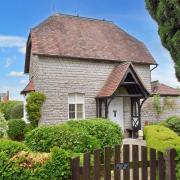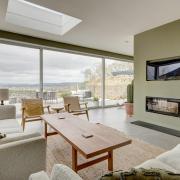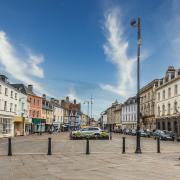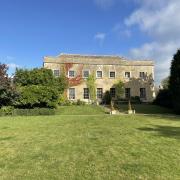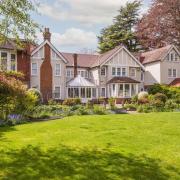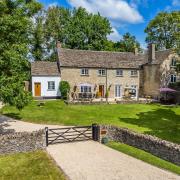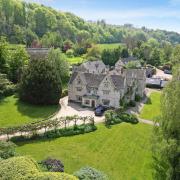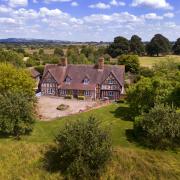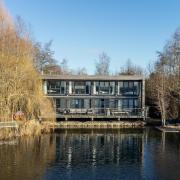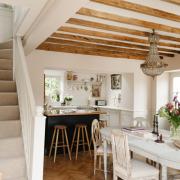Fans of the 1995 BBC series based on Jane Austin’s classic novel Pride and Prejudice will no doubt recognise the home of Elizabeth Bennet and her four sisters.
The pink-hued Georgian-style property hosted several visits from Mr Darcy, memorably played by Colin Firth, and his friend Mr Bingley (Crispin Bonham-Carter), as well as the dastardly Mr Wickham (Adrian Lukis).
It was the place in which Alison Steadman’s Mrs Bennet frequently had the vapours and took to her bed, and where her eccentric husband, performed by Benjamin Whitrow, read books in his study and strode around the gardens trying to make sense of the trials and tribulations of his daughters.

For several months, Luckington Court near Malmesbury became Longbourn in Hertfordshire, the setting for Austin’s famous story of manners, in which Elizabeth Bennet, played by Jennifer Ehle, discovers the repercussions of hasty judgements and comes to understand the difference between the goodness people want us to see and what actually lies within.
The nine-bedroomed property, an architectural gem with its Queen Anne pillared portico, from which the Bennets waved off the wayward Lydia after her eventual marriage to Wickham in the TV adaptation, is currently on the market with Hamptons, which describes it as a “fine country seat of historical significance”, with extensive accommodation, four independent cottages and a staff flat.
The site once belonged to King Harold II, who had a manor house there before his death at the Battle of Hastings in 1066.

It went on to be extended and remodelled by the Fitzherbert family, who purchased it in 1632 and continued to own it until the early 1800s, while the Johnson-Ferguson family made several additions, including the service wing to the north, in 1921.
Luckington Court became the home of Lt Col Trevor Horn, the first director of the prestigious Badminton Horse Trials three-day event, from 1947 and has remained in the hands of his family ever since. Extensive renovations were carried out in 2003 to improve and modernise the estate.
Luckington Court is a Grade II*-listed Cotswold stone detached house that bears witness to several architectural styles from its long history.

At the rear there are Tudor features, including stone mullioned windows, while the magnificent carved wooden doorway that lies beneath the portico was reputedly created by the celebrated Grinling Gibbons.
It has a hipped roof with corner urns and eighteen sash windows with moulded stone surrounds, while notable historical features inside include an enclosed staircase with a panelled dado and turned balusters to the landing.
All in all, Luckington Court provides flexible living accommodation with a combination of naturally-lit and open flowing areas that make it an excellent property for entertaining.

The large reception hall has a limestone flagged floor and a beautiful fireplace with decorative moulding. This leads to a central inner hall, with doors to the principal reception rooms.
The dining room as an open fireplace and access to a separate study.
The large drawing room has decorative panelling, a stone open fireplace and doors into the music room, with a French door into the garden and access to the cellar.
The sitting room is a more intimate space, with an open inglenook fireplace.
The large open plan family kitchen/breakfast room has a range of fitted units and a four-oven AGA, and there is a separate scullery and utility room.
Steps from the inner hall lead into a charming triple aspect stone loggia, with full-height French doors that connect the outside with the inside through a characterful stone pergola.

The top floor has further rooms that could be utilised as either additional bedrooms or hobby spaces, and they’d make a great suite for a nanny.
Outside there’s a walled garden, a parterre and a tennis court.
The property is approached through impressive gates and down a gravel driveway, which runs through a wild meadow and orchard of mature apple and cherry trees, with traditionally managed parkland on either side. The extensive lawns approaching Luckington Court are dominated by a 400-year-old Lebanese Cedar, which has one of the largest girths ever recorded within the UK and sits among tall and majestic Scots pines.
Other attractive trees throughout the grounds include a specimen golden Indian bean (catalpa), a tulip (liriodendron), a fruiting mulberry, a hankerchief (davidia) and many lilacs. Wisteria covers the pergola.
Outbuildings include a 17th century square dovecot, a Grade II-listed stable block with seven loose boxes and a coach house, tack room and feed store.

There’s an outdoor riding school, a farmyard containing a traditional range of buildings and four cottages, with modern interiors and well-maintained exteriors. Most have their own enclosed private gardens and all have allocated parking. The cottages are largely let on Assured Short Hold Tenancies.
The 20 acre grassland estate beyond includes good-sized paddocks and is fenced with mature hedges and stone walls. Beyond is a good network of bridleways and national trails.
Luckington sits close to the Gloucestershire/Wiltshire border and is not far from the M4 motorway. Kemble Airport is 14 miles away and Bristol Airport 28 miles.
The village has a primary school, pub, village hall, shop and church.
Close by are several renowned educational establishments, including Westonbirt, Beaudesert Park, St Mary’s Calne, Badminton, Kingswood and Marlborough College.

A spokesman for Hamptons’ Cirencester branch says Luckington Court is 'an exemplary English country dwelling house' and praised its 'elegant, well-proportioned rooms, good ceiling heights and tall sash windows' that all add to its appeal.
'It provides not only a wonderful home and place to live but also a profitable estate with a good residential income stream,' he said.
* Luckington Court is on the market with Hamptons, Cirencester branch, with a guide price of £5 million. www.hamptons.co.uk




